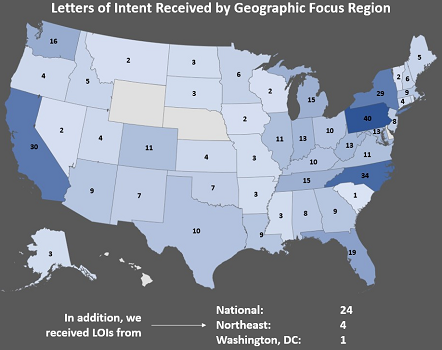News & Updates — President’s Update
In this season of giving thanks, I wanted to express my sincere appreciation to the many of you who submitted proposals during FORE’s first-ever request-for-proposal (RFP) process.

We received more than 440 responses from organizations in 46 states, representing those working in academia, nonprofits, public charities, government agencies, health systems, and federally qualified health centers. As we hoped, the proposed projects further FORE’s four overarching goals:
- Educating providers about opioid use disorder (OUD) prevention and treatment
- Expanding and sustaining evidence-based treatment and payment approaches
- Informing state and federal policies
- Raising public awareness of effective strategies to curtail the opioid epidemic
The volume of proposals vastly exceeded our expectations and has made the process highly competitive. In this initial round, we invited full grant proposals from about 20 percent of the organizations that submitted letters of intent. We will announce our first grant awards by the end of January. In the meantime, I want to share a few of our observations so far.
Even with public dollars and other resources, there is still substantial room for a small foundation to help. We were heartened to hear about the incredible work taking place in communities around the country and have gained a clearer understanding of how we might help. At the same time, we realized some applicants may be unaware of the availability of state and federal funding for their efforts. It seems clear that government leaders can do more to raise awareness when there are state and federal grants for certain direct services, such as telehealth-based treatment or naloxone supplies. It may also help if we share information with other funders about unmet needs identified during the RFP process.
There is a pressing need to build the nation’s behavioral health infrastructure. The proposals laid bare the fact that behavioral health services were few and far between in many parts of the country well before the opioid crisis increased demand. Today, psychiatrists, primary care providers, and other prescribers as well as counselors, coaches, and other professionals are struggling to deliver OUD treatment to all in need. These professionals need training opportunities and ongoing support.
Several efforts target vulnerable populations. We received proposals from people working in rural, urban, Native American, and other communities where people may be particularly vulnerable because they have low incomes, poor health, and/or limited access to care. The populations they serve are diverse, from pregnant women and mothers trying to juggle treatment with parenting to people just released from jails and prisons who are at high risk of relapse, overdose, and death. Our goal is to ensure that all those in need are served.
More clarity on FORE’s funding priorities is needed. We received nearly 200 responses to our survey asking for feedback on the RFP process. The most common suggestion was to offer more details about what we do and do not fund. Our first round of grants will do just that by enabling us to share concrete examples.
We are thankful to all those who have taken the time to submit proposals. In early 2020, we will continue to fund new opportunities and we hope you remain part of our network. The work of each and every one of you is vital to ending the opioid crisis.
(Picture: FORE’s inaugural RFP elicited proposals from over 440 organization from 46 states.)